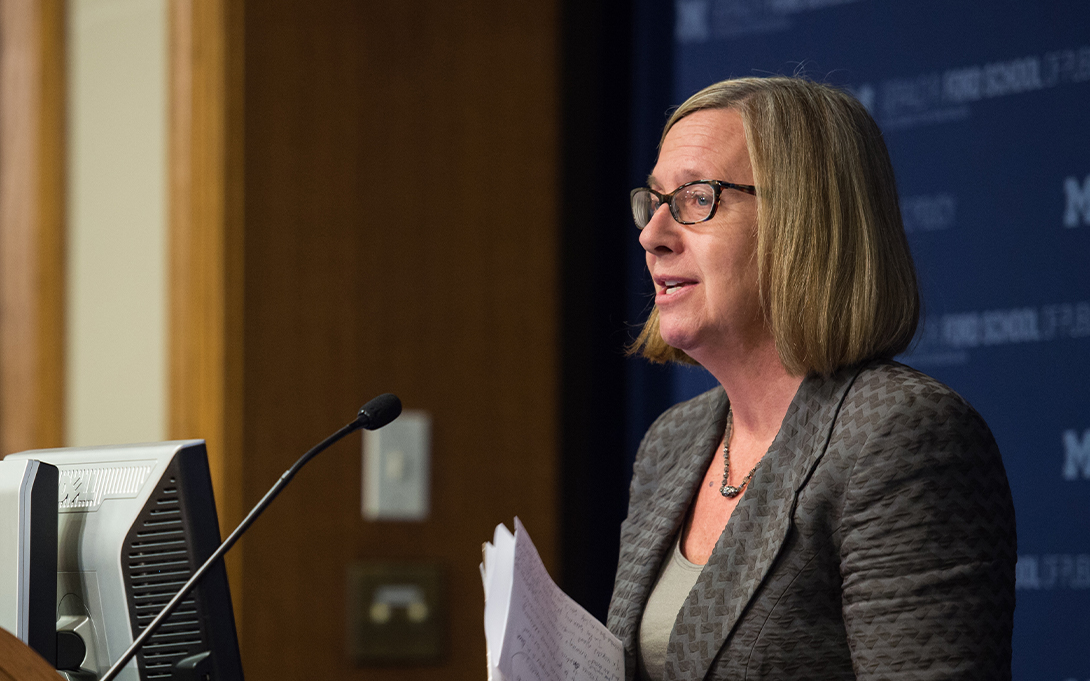
Paula Lantz, associate dean of the Ford School and James B. Hudak Professor of Health Policy, and Michael S. Barr, dean of the Ford School, discussed the emerging social epidemiology of COVID-19 and current understanding regarding public health and social policy responses on June 17. The video of the entire discussion can be seen here.
Here are some of the highlights of the discussion:
The virus
You really couldn't, if it was intended, design a better virus for a pandemic. We have a virus that can spread from person to person, from someone who has it and doesn't ever even have any symptoms. People can get the virus and then spread it to others while they are in a pre-symptomatic phase. And that can last up to 14 days in some cases it appears perhaps even longer that people before symptoms appear. Many people can get COVID-19 but not really even feel sick enough to stay home, to stop interacting with family. And so all of those things are bad for community spread.
USA
Right now, the United States has the terrible distinction of being the country with the highest number of cases, and if we put that into a rate per population, we're even worse. We got a late start in many places to those social distancing, public hygiene emergency orders from governors, and we are way behind in testing and contact tracing of people who tested positive.
We didn't know it was coming, we didn't know it would hit us like it did. We weren't prepared. You know, the public health infrastructure in this country has crumbled. For several decades multiple administrations have seriously underfunded public health agencies. We have a pandemic playbook, but not the resources at all to implement it.
But other issues are ones that become more political and are less easy to sort out. What is very disturbing to me is that in the United States, can we trust the data? Do you trust the data coming out of Florida? I wouldn't. An epidemiologist in Florida, a whistleblower, got fired for saying, “I've been told to fudge the data on the number of cases.” That is greatly disturbing to me because if we can't track the data, if we don't have confidence in the data, that is just bad for public health. It will undermine trust in government more broadly that is essential for getting us out of this crisis
Michigan
There has been a huge amount of controversy about the way in which Michigan put in place pretty strict orders to limit the kinds of interactions we have with each other to try and reduce the infection rate.
When states do different things and countries do different things it actually gives nerdy policy analysts like all of us at the Ford School the opportunity to use natural experiment research designs to try to really understand what has been the impact of these things.
Some modeling work has been done by colleagues of ours here at the University of Michigan in the School of Public Health. Professor Emily Martin led a team that really looked at what we would expect in Michigan in terms of the coronavirus outbreak. Using the daily data that is generated in state and made public, the conclusion as of June 1st was that without the social distancing measures that were implemented in the state of Michigan, we would have likely seen 28,000 more cases of COVID-19 in the state. And probably about 3,500 more deaths.
Michigan is opening up slowly. And that's the right way to do it. Open up slowly and then, keep your eye on the data. If things start going up again, we might have to pull back on some of the things we're being allowed to do. But if you pull away all of social distancing measures overnight and everyone just goes out and is their wonderful self again out in the world, that I think without any question, that's going to lead to a second wave or another spike.
Inequity
A really disturbing fact of the COVID-19 crisis is that it's really laid bare all the racial and economic social inequities in our society. Viruses don't have biases, viruses aren't racist, viruses don’t discriminate. But there are many, many things about our society and our social structure that put people at different risk levels for exposure. And then, once exposed, and getting COVID, their risk factors for serious illness and death.
We know that racial and ethnic minority status is definitely “a risk factor”. Structural racism in our society means that African Americans, and Hispanics are going to die at much higher rates than whites from this disease.
We need to do something about environmental racism, and agree that everyone should have access to what the World Health Organization calls basic materials of health: food security, clean water, clean air, housing security, a physically safe environment. If we don't do better on those things, as with this virus the way it crests and goes up and down, probably what will happen when another pandemic hits us, we will be in the same situation.
Paula Lantz is the associate dean for academic affairs and the James B. Hudak Professor of Health Policy at the Ford School. She also holds an appointment as professor of health management and policy in the School of Public Health. Lantz, a social demographer, studies the role of public policy in improving population health and reducing social disparities in health. Lantz is currently engaged in research regarding the potential for and challenges associated with using social impact bonds to fund public/private partnerships aimed at improving health in low-income populations, including Medicaid beneficiaries. An elected member of the National Academy of Social Insurance and the National Academy of Medicine, Lantz received an MA in sociology from Washington University, St. Louis, and an MS in epidemiology and PhD in sociology from the University of Wisconsin.